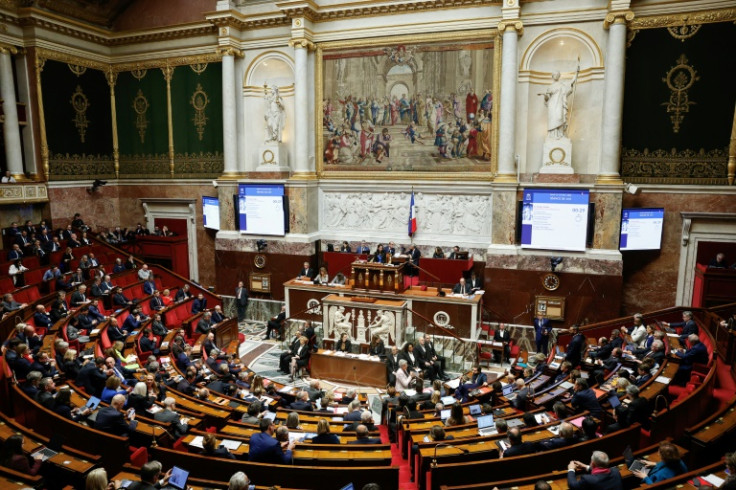After Budget Row, French MPs Pass 'Special Law' To Keep Show On The Road

More than a week after a historic no-confidence vote brought down a prime minister unable to secure backing for an austerity budget, French lawmakers Monday unanimously passed a law to keep tax and social security machinery running.
A minimalist bill designed to keep the policy-making show on the road was passed 11 days after the turmoil engendered by the downfall of Michel Barnier after barely three months as prime minister.
Barnier suffered the first successful no-confidence action since a defeat for Georges Pompidou's government in 1962, when Charles de Gaulle was president, as he became contemporary France's shortest-serving premier.
The text of the law was adopted unanimously by 481 lawmakers voting in the chamber -- though the far-left France Unbowed party abstained -- thereby avoiding a financial shutdown, and the text will now go Wednesday to the Senate for further examination.
There was bickering even amid the unanimity, however, as many opposition MPs deplored the fact that National Assembly Speaker Yael Braun-Pivet declared as inadmissible amendments to index the income tax scale to inflation.
Opposition lawmakers maintain France's Constitutional Council should decide on the issue once the law has been adopted.
In the absence of indexation, "380,000 new households" could end up being taxed, according to outgoing budget minister Laurent Saint-Martin, though this could be corrected later, notably in a draft budget.
For now, the state will operate with the special law, whose main article allows the executive to levy taxes on the basis of those voted last year pertaining to this year.
The executive will then be able to commit to spending by decree but on a level it "deems essential to continue the execution of public services" as well as, notably, aid for the cyclone hit territory of Mayotte.
It will then fall to the incoming government under Francois Bayrou as new prime minister to draw up a budget and get it adopted during 2025.
However, Eric Coquerel, the far-left president of the parliamentary finance committee, vowed to oppose "any austerity budget" which will have to be formulated in the months following the post-holiday season recess, which runs to January 13.
Before he was ousted, Barnier, the fifth prime minister to serve under President Emmanuel Macron since he came to power in 2017, had argued that the proposed cuts were necessary to stabilise France's finances with the public deficit running at 6.1 percent of output this year.
Just prior to Monday's vote France's central bank downgraded its 2025 growth forecast to 0.9 percent from 1.2 percent, citing "increased uncertainty" for the economic outlook both at home and abroad, and also reduced its forecast for 2026 by 0.2 percentage points to 1.3 percent.
The latest forecasts came two days after Moody's downgraded France's credit rating to Aa3 on the back of months the budget standoff.
© Copyright AFP 2024. All rights reserved.





















